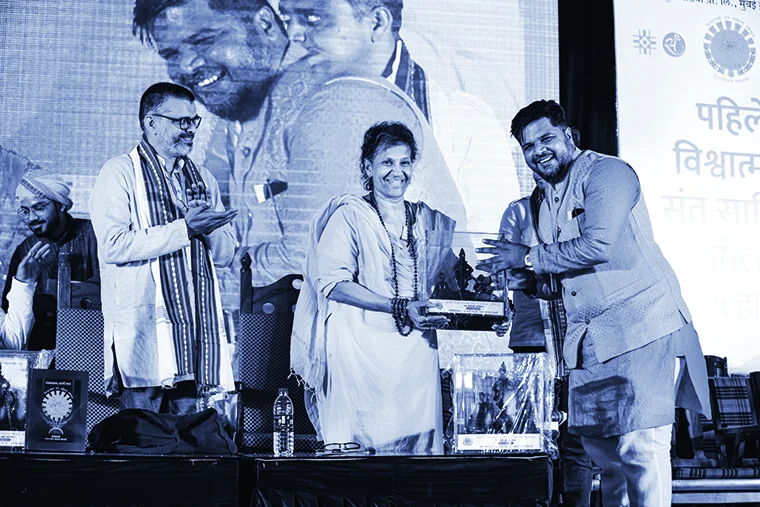Academic Sessions
Vishwatmak Sant Sahitya Sammelan

At the core of each of the Sammelans are the Academic Sessions that invite spiritual leaders, thought leaders, academicians, poets, artists, authors to come together over discussions, presentations, deliberations, debates on learnings, experiences, and perspectives – a practice that is ancient in India, and so necessary in a world going increasingly global.
The first one, the Vishwatmak Sant Sahitya Sammelan was built around Academic Sessions to deliberate on issues of import in the world of spirituality so that the wellbeing of humanity and ecology is furthered.
Academic Sessions 1
Bhakti Sampraday Ani Vishwatmakta
(The Legacy of Bhakti and Universality)
The first session of the Sammelan focused on how the Bhakti Sampradaya across religions helps us keep in mind the idea that we are all in this together, that the human condition is the same even across our apparent differences.
Dr Ramchandra Dekhne in his opening notes reminded us that the first Marathi Sant Sahitya Sammelan was convened by Sant Dnyaneshwar in the holy city of Pandharpur. And today, we are learning more about bhakti under the shade of the same tree that was planted seven hundred years ago.
Dr Anupama Ujgare spoke about Christian saints like Peter and Paul who preached their own Bhakti Philosophy through a series of letters that eventually became the New Testament.
Vinod Sinha called the Bhakti Andolan the first truly Democratic Movement in India, as the Sants brought god closer to commoners by translating religious literature to local tongues and by making abstract concepts more accessible through folk articulation.
Dr Sriram Narainswami emphasized universalism through the lens of Puranas. From humans, to animals and even the hills and mountains, bhakti is everyone’s right, everyone’s practice. This inclusivity becomes the soul of Sanatan Dharma.
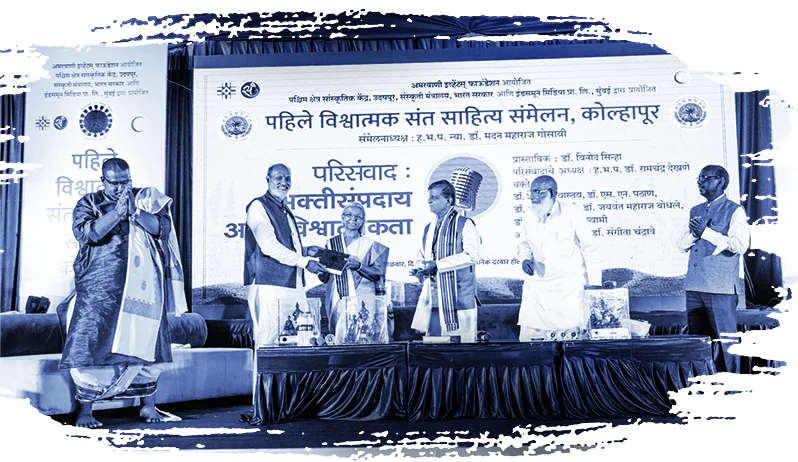
From Left to Right:
Dr Sriram Narainswami (Sanskrit Scholar and Researcher of Vedic Teachings)
Mohan Goswami (Tiwari) honouring Dr Anupama Ujgare (Literature Expert and Writer)
Late HBP Dr Ramchandra Dekhne(Acclaimed Folk Artist, Keertankar, and Researcher)
Dr Mohammad Azam (Expert on Sufi Literature)
Dr Shailendra Srivastav (Hindi Literature & Culture Expert)
Shailendra Shrivastav expressed that a devotee rooted in regional traditions is a true universalist while one who forgets their roots cannot even belong at home.
Dr. Mohammad Azam saw universalism as an extended teaching of Sufi Philosophy that preaches its followers to change the world starting from within their own selves.
Academic Sessions 2
Bhakti Vasa ki Vyavsay
(Devotion as a Pledge towards the Well-being of Society vs Devotion as Livelihood and Business)
The difference between Bhakti for Siddhi (accomplishment) vs Bhakti for Prasiddhi (Fame) was touched upon by Ulhas Pawar.
BB Shastri gave incidences of temples being disbanded in times of drought to distribute collected wealth amongst the people.
Pramod Shinde argued that if Bhakti can become business, there is scope to make every business more Bhaktimay as well!
Inlay – Ulhas Pawar closed the session with a very interesting anecdote: Foreigners looking upon the Pandharpur Wari pilgrims walking barefoot once asked Mamasaheb Dandekar whether they were beggars to walk barefoot. Mamasaheb replied, “Indeed they are beggars. They are begging for the well-being of the entire world!”
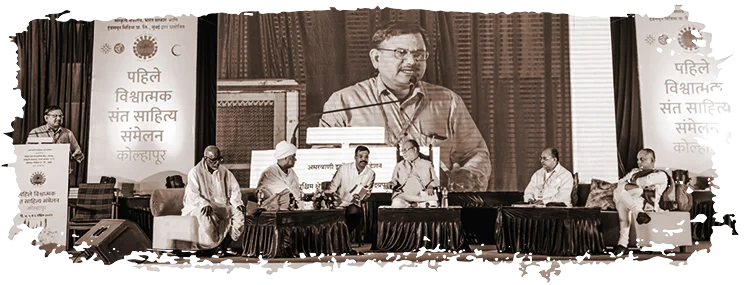
From Left to Right:
On the dais – Dr Martand Kulkarni (Sant Sahitya Researcher)
Dr Ramkrishna Lahvitkar (Sant Sahitya Researcher)
B B Shastri (Sr Researcher, Mahanubhav Panth)
Dr Sarjerao Jige (Literary Person)
Ulhasdada Pawar (Sant Sahitya Researcher, Politician)
Dr Pramodbhai Shinde (Head, Manashakti Research Center)
HBP Pankaj Maharaj Gawde (Keertankar)
Academic Sessions 3
Aswastha Vartamanat Sant Vicharanchi Bhumika
(The role of Sant Philosophies in the Unstable Today)
Dr. Shreeram Pawar submitted that the problems in the current times arise out of a triumvirate of Moh (desire), Bhay (fear) and Sandeha (doubt).
Of the body, Bhushan Swami said that medicine can solve. For the mind we need Sant Sahitya.
Dr Avatar Singh reminded us of unstable times like today in the Dwapar yug and Treta yug. His solution was to take up any one Abhang and practice its teachings for the whole of our lives.
To which Ravindra Thakur said that most teachings by Sants arise in unstable times, hence, they can become our anchors today too.
Digambar Shirke brought the conversation to the burning issue of Climate Change, reminding us that Sant Tukaram, in the 17th century, had tried to teach us Vrikshavalli Amha Soyri (the trees and ecology are family to us) and we had failed to heed him.
Highlight – Vrikshavalli Amha Soyri is a popular Abhang by Sant Tukaram, also put to music in modern times by music legend Shrinivas Khale and sung by Bharat Ratna Lata Mangeshkar.
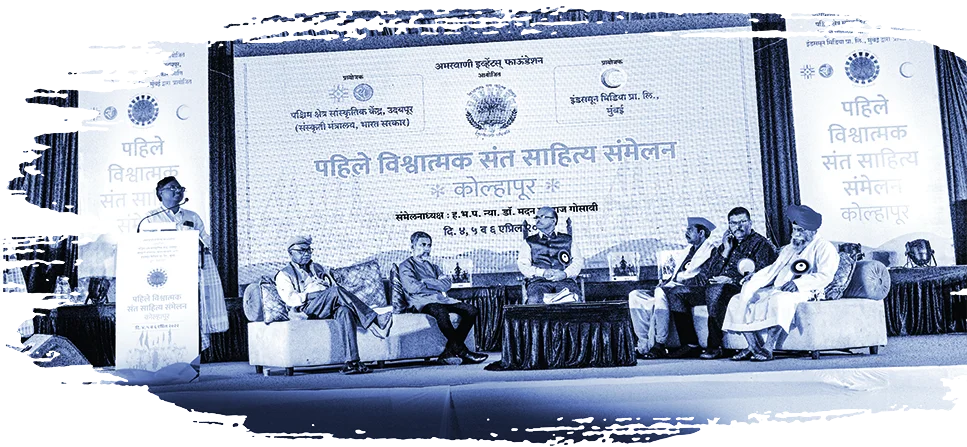
From Left to Right:
On the dais: Dr Shivajirao Huse (Sant Sahitya Researcher)
Dr Ravindra Thakur (Sant Sahitya Researcher, Professor at Shivaji University, Kolhapur)
Dr Shriram Pawar (Editor, Dainik Sakal)
Dr Digamber Shirke (VC, Shivaji University, Kolhapur)
HBP Dr Bhushan Swami (Expert on Literature by and Direct Descendant of Swami Ramdas)
Rajendrakumar Chaugule (Editor, Dainik Punyanagri)
Dr Avtar Singh (Exponent & Expert of Sikh Culture)
Academic Sessions 4
Sant Sahitya Ani Lok Tattva Bhumika
(Sant Literature and Popular Beliefs)
This session sought to enumerate the belief systems that lead to value systems that guide a society and the individuals in the society towards certain behaviours and ambitions, and away from some.
Mukund Kule spoke about the belief systems of the Warkari Sampraday. Yogesh Mishra spoke about how specific books or articulations like the Dnyaneshwari or the Ramayan, over a course of time, become codes of conduct for posterity.
Satish Badwe explored how masses colloquially thought of as uneducated are still exposed to the teachings of Sants through Keertans, Pravachans, through everyday language and poetry.
To conclude, Prakash Khandge pointed out how Sant culture was democratic and that Sants resonated with the common folks because they came from them.
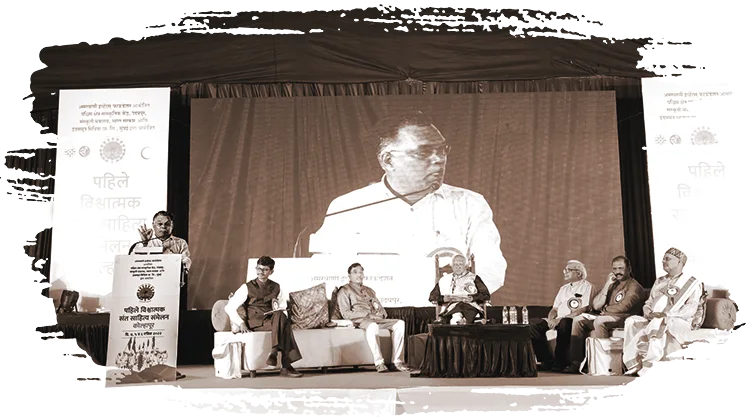
From Left to Right:
Dr Ganesh Chandanshive (HoD, Lokkala Academy, Mumbai University)
Dr Vidyasagar Patangankar (Sant Sahitya Researcher)
Dr Prakash Khandge (Senior Lok-kala Researcher & Mentor)
Dr Satish Badwe (Sant Sahitya Expert)
Dr Mukund Kule (Journalist and Sant Sahitya Researcher)
Dr Yogendra Mishra (Ramcharit Manas Scholar)
Academic Sessions 5
Sant Sahitya Ani Paryavaran
(Sant Sahitya and the Environment)
Climate Change is a burning issue in the 21st century. Some people are even calling it the Climate Emergency. For the west that sees nature as separate from the human species, preserving nature becomes a radical insight. For India, nature is neither separate, nor lesser. In our culture that speaks about Advait or non-separatedness, nature or Prakriti becomes all that there is to our experience of the world – we are simply playing our role in it.
Shrish Chitnis, in his opening remarks, noted Sant Tukaram’s ideals where he says that humans are not above nature.
Kalyan Gangwal stated that the whole world accepts India’s leadership towards conserving the environment.
Shivajirao More spoke about increasing the ratio of trees to person in India from the current 28 to at least 422 as in the UN charter. He also spoke about the value of vegetarianism towards the cause of the environment.
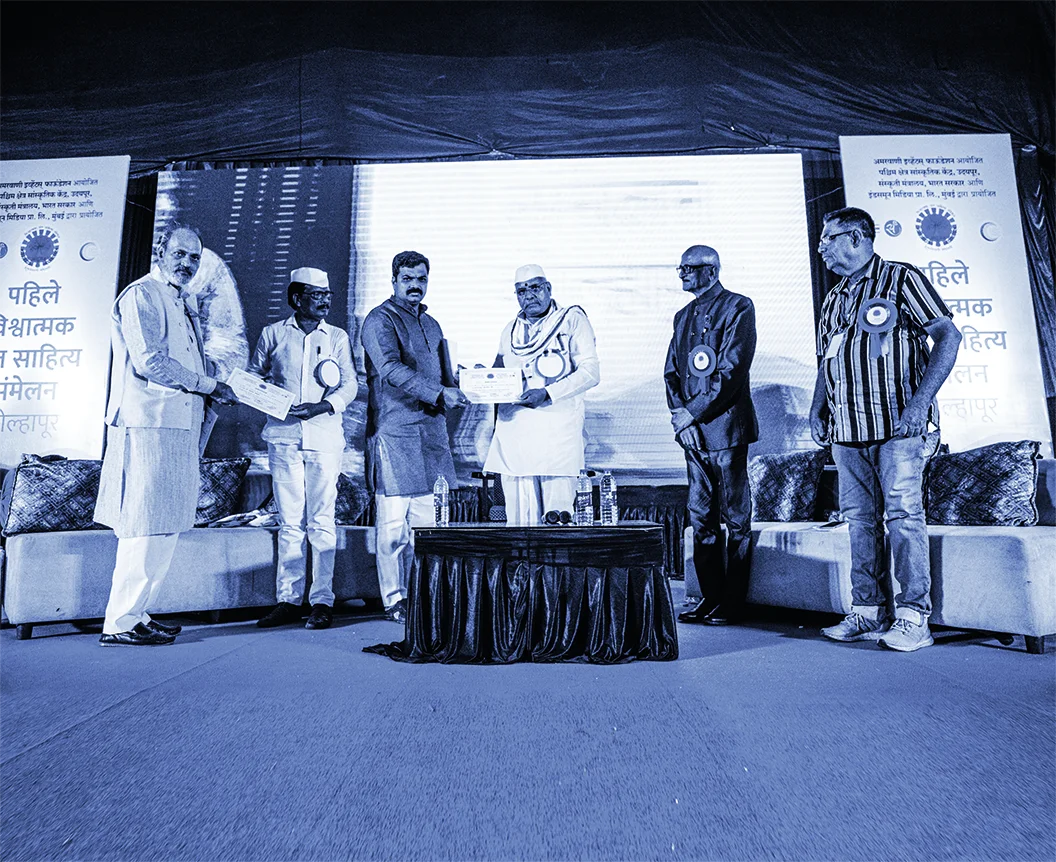
From Left to Right:
Mohan Goswami (Tiwari) presenting certificate to Dr Dhananjay Honmane (Sant Sahitya Researcher)
Jagannath Patil presenting certificate to HBP Shivajirao More (Environmental Activist, Descendant of Sant Tukaram, Sant Sahitya Expert)
Dr Kalyan Gangwal (Expert on Jain Sant Sahitya & Proponent of Vegetarianism)
Shirish Chitnis (Literary Activist)
Special Session
With Foreign Delegates
Sant Sahitya Ani Paryavaran
(Sant Sahitya and the Environment)
To flag off the Vishwatmak Sant Sahitya Sammelan a specially curated panel of higher education students from five countries spoke about spiritual traditions from their homeland.
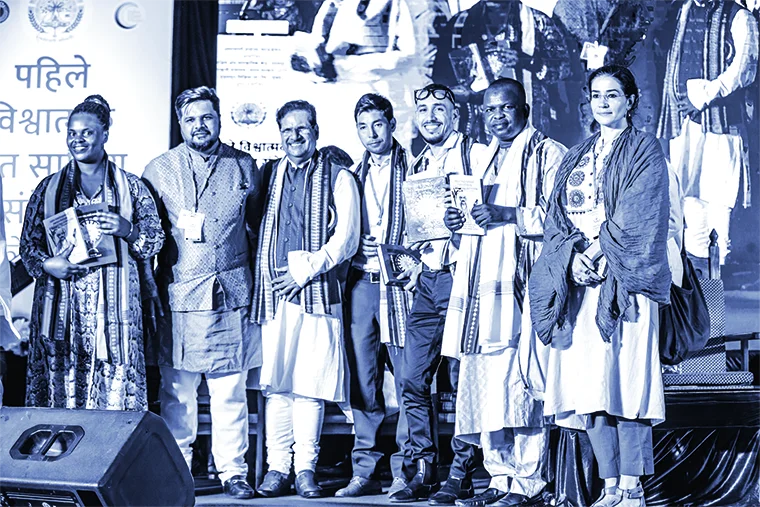
From Left to Right:
Alison Nuwampire from Uganda, Adv Akshay Gosavi, Sammelan Adhyaksha Dr Madan Maharaj Gosavi, Irfan Mohammad Ali from Afghanistan, Adda Zerfi from Algeria, Murtala Aminu from Nigeria, Pooneh Khajeh Hassani Rabari from Iran.
A moment of levity with the moderators of the special session, senior journalist Prafulla Ketkar and Sadhvi Radhikananda. Adv Akshay Gosavi of the organizing team of the Sammelan presenting a memento to Sadhvi Radhikananda.
